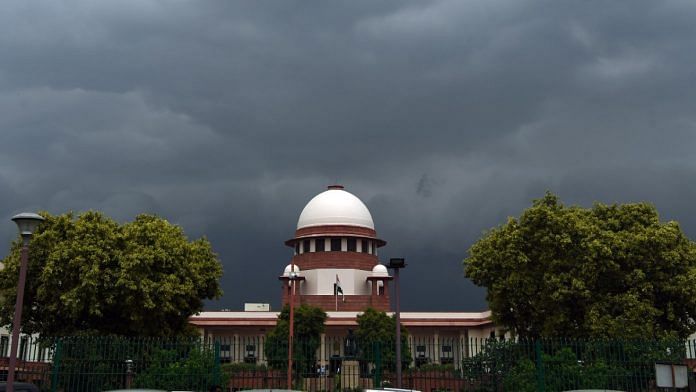New Delhi: The Centre Wednesday reiterated its “humble request” to the Supreme Court not to rewrite the Special Marriage Act (SMA) for legal validation of same-sex marriages, claiming the LGBTQ++ community was an unidentified class of persons and legalising a marital relationship between members of this group could potentially create hurdles in the implementation of other statutes.
Opening arguments for the Centre on the fifth day of the hearing, Solicitor General Tushar Mehta said the subject of extending legal recognition to same-sex marriages should “better be left to the choice of the Parliament”.
Marriage, he also said, was not an absolute right, even between heterosexual couples.
The solicitor general further clarified that the legislature intended to keep homosexuals out of the ambit of SMA, even as the petitioners want the top court to interpret the Act and legalise same-sex marriage.
Mehta took the court through the legislative history of the “areligious law”, which, he contended, was to provide a platform for inter-faith and inter-caste marriages. Therefore, he submitted, the court cannot read “something in the law” which was “consciously omitted from it” by the framers.
According to Mehta, the five-judge constitution bench may not be able to conceive a “variety of situations” that may arise in case same-sex marriages are given legal validation.
Only the Parliament can delve into this subject because the legislature is competent to foresee these problems, solve them and also regulate the rights, if extended to the community, he added.
Mehta drew support from judgments delivered by foreign jurisdictions in support of his argument that the judiciary has limited powers when it comes to dealing with rewriting of laws and also submitted a chart to depict that in 24 out of 29 countries where same-sex marriage is allowed, the Parliaments took initiative to legalise such unions.
Also read: In India, every bride is Valli & every groom Subramanya. Same-sex marriage isn’t that
‘Marriage not an absolute fundamental right’
The five-judge bench hearing the petitions is led by Chief Justice DY Chandrachud and has Justices SK Kaul, SR Bhat, Hima Kohli and PS Narasimha as its members. Though some of the petitioners had asked for the court to interpret both the Hindu Marriage Act (HMA) as well as the SMA to legally recognise a same-sex wedlock, the court has decided to steer clear of personal or religious laws.
Mehta also argued that marriage between a heterosexual couple gained societal acceptance, leading to its codification for Hindus. However, codification, he added, introduced regulation of marriages and also contained prohibitions towards members of the community.
“Once the law recognises these socio-legal institutions, such as marriage, there is regulation. A codified law protects privacy, but there are instances when it also invades this right,” Mehta said, while expanding on his submission that marriage is not an absolute fundamental right.
This legal recognition and regulation can only be done by the legislature because it is the latter that can conceive several situations that may arise due to such a recognition and also provide resolution, he argued.
Mehta added that the government was not opposed to the idea of legalising same-sex marriages, but the question is who is to regulate it. Moreover, the court’s exercise to rewrite SMA is constrained by four fundamental principles, he submitted.
Firstly, he said, “The court will not change the character of the law and its character has to be examined from the entire architecture of the act, read with all alive statutes and history that preceded enactment of the SMA.”
The solicitor will continue with his argument on this point Thursday.
Secondly, he said the court cannot substitute the legislative intent, which is otherwise manifest and that is not to grant recognition to same-sex marriages. And, if the court is persuaded to rewrite the Act, then it would “necessarily have an unintended effect on the marriages between heterosexual couples,” Mehta added.
The solicitor then moved on to the definition of LGBTQ++, which, he said, has multiple shades. “We are not just dealing with lesbians, gays or transgenders. This is an unidentified class of persons,” Mehta said. He added there were 72 types of genders associated with LGBTQ++ community and to legalise their union would lead to difficulties in the application of other laws on them.
According to Mehta, there are over 160 provisions that could get impacted if the court interferes to modify the current form of SMA.
Since the legislative policy has always identified “conventional man and conventional woman” in all laws, whether criminal or civil, therefore, when the question on same-sex marriage is being debated for the first time, it should first go to the Parliament or state legislature, Mehta asserted.
“No one is sitting on value judgment on whether this is good, there is no stigma attached to it. Parliament has accepted the right of choice, sexual autonomy in terms of preference and right of intimate relationships,” Mehta said, pointing to the Transgender Act that includes all shades and spectrums of the LGBTQ community.
“Right to marry does not include the right to compel the State to create a new definition of marriage,” Mehta submitted.
Also read: Neither ‘urban’ nor ‘elitist’ — what data shows about Indians’ views on same-sex relationships



